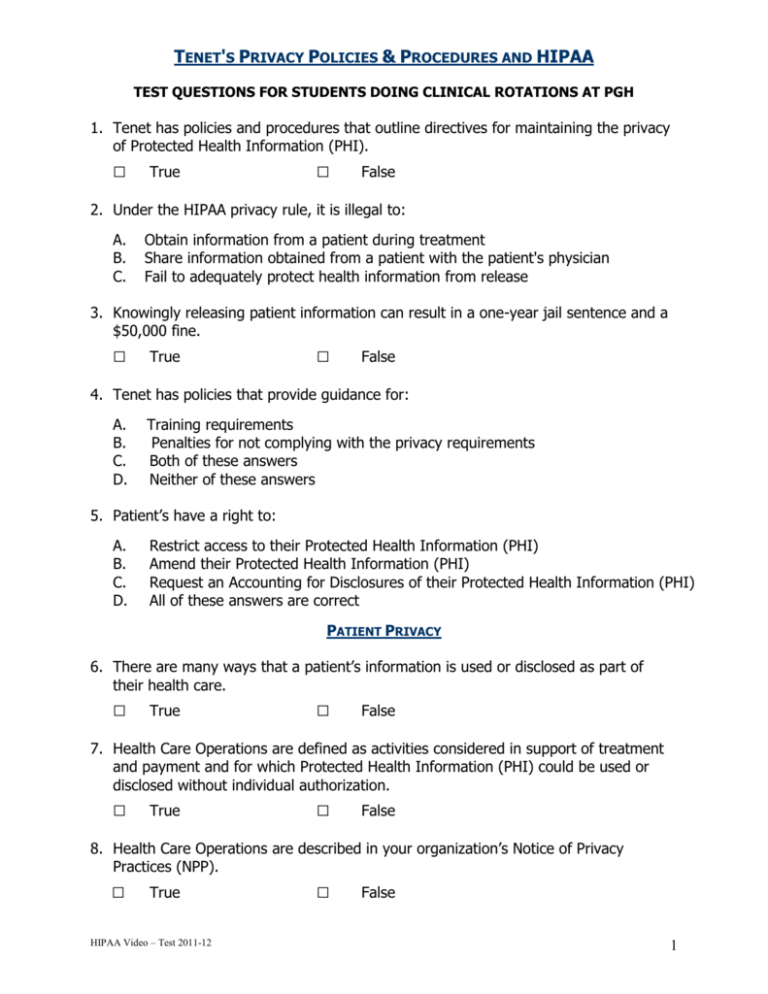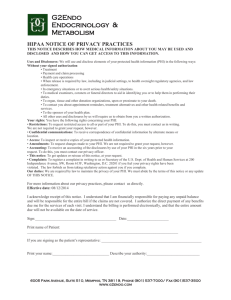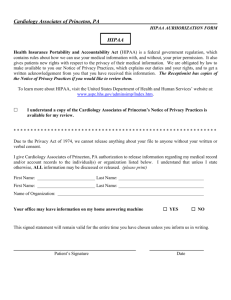TEST QUESTIONS LESSON #1 - TENET'S PRIVACY POLICIES
advertisement

TENET'S PRIVACY POLICIES & PROCEDURES AND HIPAA TEST QUESTIONS FOR STUDENTS DOING CLINICAL ROTATIONS AT PGH 1. Tenet has policies and procedures that outline directives for maintaining the privacy of Protected Health Information (PHI). □ True □ False 2. Under the HIPAA privacy rule, it is illegal to: A. B. C. Obtain information from a patient during treatment Share information obtained from a patient with the patient's physician Fail to adequately protect health information from release 3. Knowingly releasing patient information can result in a one-year jail sentence and a $50,000 fine. □ True □ False 4. Tenet has policies that provide guidance for: A. B. C. D. Training requirements Penalties for not complying with the privacy requirements Both of these answers Neither of these answers 5. Patient’s have a right to: A. B. C. D. Restrict access to their Protected Health Information (PHI) Amend their Protected Health Information (PHI) Request an Accounting for Disclosures of their Protected Health Information (PHI) All of these answers are correct PATIENT PRIVACY 6. There are many ways that a patient’s information is used or disclosed as part of their health care. □ True □ False 7. Health Care Operations are defined as activities considered in support of treatment and payment and for which Protected Health Information (PHI) could be used or disclosed without individual authorization. □ True □ False 8. Health Care Operations are described in your organization’s Notice of Privacy Practices (NPP). □ True HIPAA Video – Test 2011-12 □ False 1 TENET'S PRIVACY POLICIES & PROCEDURES AND HIPAA 9. Minimum necessary means that, when Protected Health Information (PHI) is used, disclosed, or requested, reasonable efforts must be taken to determine how much information will be sufficient to serve the intended purpose. □ □ True False 10. Tenet’s Privacy Policies and Procedures cover use or disclosure of Protected Health Information (PHI) in the following format: A. B. C. D. Oral communications Written documents Electronic transactions All of the above RESPONSIBILITIES OF THE WORKFORCE 11. It is important to remember that you should never discuss patient information with anyone unless it is for an approved purpose. □ True □ False 12. It is important that patients understand how your organization protects their health information. Patients are provided with an overview of your organizations privacy practices in a Notice of Privacy Practices (NPP). □ True □ False 13. Which of the following is a procedure that protects the confidentiality of patient information? A. B. C. D. Medical record file cabinets and file room doors are kept locked. Passwords to access computerized medical records are not shared. There are rules that prohibit employees from looking at records unless they have a need to know the information. All of these answers are correct. 14. It’s the duty of every member of Tenet’s workforce to protect the confidentiality and privacy of patient health information. □ True □ False 15. If you suspect someone is violating Tenet's privacy policies, you should: A. B. C. Try to ignore the violation if it doesn't directly concern you Watch the individual until you have gathered solid evidence Report your suspicions to your supervisor HIPAA Video – Test 2011-12 2 TENET'S PRIVACY POLICIES & PROCEDURES AND HIPAA TEST QUESTIONS FOR STUDENTS DOING CLINICAL ROTATIONS AT PGH NAME SCHOOL DATE 1. □ True 2. A B 3. □ True 4. A B C D 5. A B C D 6. □ True □ False 7. □ True □ False 8. □ True □ False 9. □ True □ False 10. A B 11. □ True □ False 12. □ True □ False 13. A B 14. □ True 15 A B HIPAA Video – Test 2011-12 □ False C □ False C C D D □ False C 3 TENET'S PRIVACY POLICIES & PROCEDURES AND HIPAA ANSWER MASTER 1. Tenet has policies and procedures that outline directives for maintaining the privacy of Protected Health Information (PHI). □ True False 2. Under the HIPAA privacy rule, it is illegal to: D. E. F. Obtain information from a patient during treatment Share information obtained from a patient with the patient's physician Fail to adequately protect health information from release 3. Knowingly releasing patient information can result in a one-year jail sentence and a $50,000 fine. □ True False 4. Tenet has policies that provide guidance for: E. F. G. H. Training requirements Penalties for not complying with the privacy requirements Both of these answers Neither of these answers 5. Patient’s have a right to: E. F. G. H. Restrict access to their Protected Health Information (PHI) Amend their Protected Health Information (PHI) Request an Accounting for Disclosures of their Protected Health Information (PHI) All of these answers are correct PATIENT PRIVACY 6. There are many ways that a patient’s information is used or disclosed as part of their health care. True □ False 7. Health Care Operations are defined as activities considered in support of treatment and payment and for which Protected Health Information (PHI) could be used or disclosed without individual authorization. True □ False 8. Health Care Operations are described in your organization’s Notice of Privacy Practices (NPP). True HIPAA Video – Test 2011-12 □ False 4 TENET'S PRIVACY POLICIES & PROCEDURES AND HIPAA 9. Minimum necessary means that, when Protected Health Information (PHI) is used, disclosed, or requested, reasonable efforts must be taken to determine how much information will be sufficient to serve the intended purpose. □ True False 10. Tenet’s Privacy Policies and Procedures cover use or disclosure of Protected Health Information (PHI) in the following format: E. F. G. H. Oral communications Written documents Electronic transactions All of the above RESPONSIBILITIES OF THE WORKFORCE 11. It is important to remember that you should never discuss patient information with anyone unless it is for an approved purpose. True □ False 12. It is important that patients understand how your organization protects their health information. Patients are provided with an overview of your organizations privacy practices in a Notice of Privacy Practices (NPP). True □ False 13. Which of the following is a procedure that protects the confidentiality of patient information? E. F. G. H. Medical record file cabinets and file room doors are kept locked. Passwords to access computerized medical records are not shared. There are rules that prohibit employees from looking at records unless they have a need to know the information. All of these answers are correct. 14. It’s the duty of every member of Tenet’s workforce to protect the confidentiality and privacy of patient health information. True □ False 15. If you suspect someone is violating Tenet's privacy policies, you should: D. E. F. Try to ignore the violation if it doesn't directly concern you Watch the individual until you have gathered solid evidence Report your suspicions to your supervisor HIPAA Video – Test 2011-12 5



